Government restrictions on religion
All 198 countries and territories in our study had at least some level of government restrictions or regulations related to religious activity reported in 2021. However, the severity of the restrictions and the extent to which governments enforced them varied from one place to another. The differences are reflected in each country’s score on the Government Restrictions Index (GRI).
In 2021, the number of countries with “very high” government restrictions (19) stayed the same as in 2020, remaining at its lowest point since 2014. It was the first time in four years that the number of countries in this category did not go down. (At its peak, in 2017, the number was 27.)
The number of countries with “high” levels of government restrictions fell from 38 in 2020 to 36 in 2021, marking the first time since 2017 that the number of countries in this category decreased.
Taken together, the number of countries with “high” or “very high” levels of government restrictions decreased from 57 in 2020 to 55 in 2021. (Read the Methodology for details on how the “high” and “very high” categories are determined.)
Countries with the most extensive government restrictions
Two countries, Pakistan and Turkmenistan, that were in the “high” government restrictions category in 2020 moved to the “very high” category in 2021. Pakistan’s index score increased by less than 1 point on the index, while Turkmenistan’s increased by exactly 1 point.
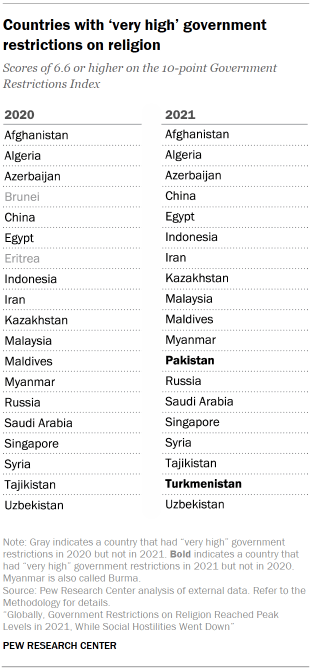
In Turkmenistan, Human Rights Watch reported in 2021 that government authorities physically harassed Muslims and accused them of “following their … faith too closely.” Police detained groups of men and forced them to shave their beards and drink alcohol to demonstrate that they were not “extremists,” according to the U.S. Commission on International Religious Freedom.
While similar incidents in Turkmenistan had been reported in previous years of this study, there were none in 2020. Turkmenistan had been in the “very high” category in 2019 before dropping to “high” in 2020. Its return to “very high” in 2021 was partially connected to these reports.
Two countries, Brunei and Eritrea, moved in the other direction in 2021 – that is, from “very high” to “high” on the GRI. Each had a decrease of less than 1 point on the index. (For a full list of all countries in each category, refer to the Government Restrictions Index in Appendix A.)
In Brunei, there were no reports in 2021 of the government targeting religious groups or individuals with deportations. The previous year, a U.S. citizen had been deported from Brunei after “proselytizing for a religion other than Islam,” in violation of the country’s sharia-based domestic laws. (The religion wasn’t specified in the sources for the study.)
Changes in scores on Government Restrictions Index
In 2021, 73 countries had increases of 0.1 point or more in their GRI scores, while 70 countries had decreases. An additional 55 countries had no change in their GRI score.
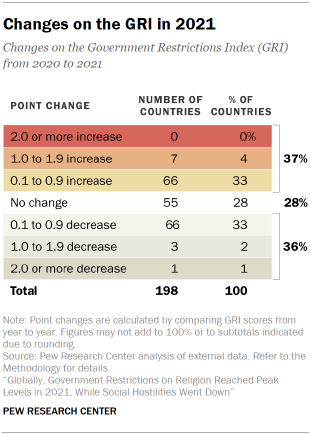
In 2021, only one country in the study, Sudan, had a large decrease (2 points or more) in its GRI score, which moved it from the “high” to the “moderate” category on the index. No country had a large increase. Ten countries had modest changes (1.0 to 1.9 points), including seven with modest increases and three with modest decreases. Almost two-thirds of the countries in the study – 132 in total, or 67% – had small changes (0.1 to 0.9), with 66 small decreases and 66 small increases in GRI scores.
Sudan’s decrease (from 5.8 to 3.2) between 2020 and 2021 is partially explained by religion-related reforms passed in July 2020 by the country’s civilian-led transitional government. These reforms included the decriminalization of apostasy (abandoning one’s faith) and the repeal of a law that had criminalized “indecent dress” or other violations of public morality.3
Social hostilities related to religion
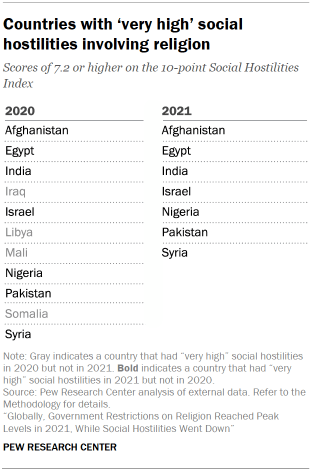
The Social Hostilities Index (SHI) captures a wide range of activities perpetrated by private individuals and social groups, including verbal and physical harassment of religious individuals; terrorism carried out in the name of religion; and conflict between religious groups.
As has been true during most years of the study, in 2021 fewer countries scored “very high” on the SHI than on the GRI. The number of countries and territories with “very high” social hostilities involving religion decreased from 11 in 2020 to seven in 2021, while the number with “high” levels increased from 29 to 36. Overall, the number of countries with “high” or “very high” levels of social hostilities rose from 40 in 2020 to 43 in 2021.
Countries with the most extensive social hostilities
Four countries – Iraq, Libya, Mali and Somalia – moved from “very high” to “high” on the SHI in 2021. While Libya, Mali and Somalia have moved between the “high” and “very high” categories over the past several years, this is the first time Iraq has had “high” rather than “very high” social hostilities, in part because there were fewer reports of ISIS forcing Yezidi captives in Iraq to convert to Islam since the group’s territorial defeat in 2019.4
In Libya, the number of casualties from religion-related terrorism and war decreased in 2021. Although terrorist groups such as ISIS and al-Qaeda in the Islamic Maghreb (AQIM) were still present in the country, there were no reports during the year of religion-related terror attacks resulting in injuries or deaths of civilians. (Refer to the Methodology for details on changes to how we coded religion-related terrorism.) Meanwhile, in Somalia, there were fewer reports of private social actors harassing religious individuals or groups than there were in 2020, when gunmen fired at Quran teachers, killing five and injuring others.
No countries moved into the “very high” social hostilities category in 2021.
For the full list of countries in each category, refer to the Social Hostilities Index in Appendix B.
Changes in scores on Social Hostilities Index
On the Social Hostilities Index, four countries had large changes (2 points or more) in their scores. Two of these countries (Montenegro and Uganda) had large increases, while two (Bolivia and Turkey) had large decreases. An additional 21 countries had modest changes (1.0 to 1.9 points), including 11 increases and 10 decreases. Meanwhile, 104 countries experienced small changes of 0.1 to 0.9 points, including 50 increases and 54 decreases.
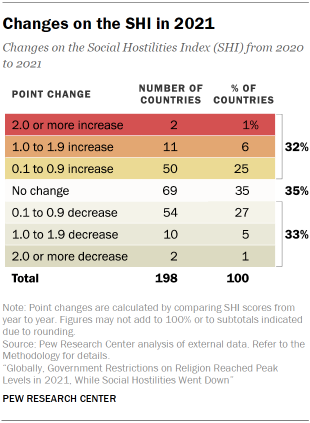
Montenegro’s increase from 1.3 to 3.5 was partially attributable to several incidents involving social hostilities against minority religious groups. In the city of Niksic, unknown perpetrators vandalized the Hadzi-Ismail Mosque in 2021 with words and phrases such as “Srebrenica,” “Niksic will be Srebrenica,” and “Turks.” (The U.S. State Department described these as references to the genocide of Bosnian Muslims in Srebrenica in 1995.)
Also in Montenegro, there was harassment related to proselytizing. For example, a local news outlet published an article that was critical of an evangelical Christian woman who was distributing Bibles. The article quoted a priest from the Serbian Orthodox Church saying that members of the evangelical group were “demons who are nothing but wolves in sheep’s clothing.”
Bolivia’s SHI score went down because, in contrast to previous years, there were no reports coded in 2021 that Protestant pastors and missionaries were expelled from Indigenous communities for not observing Andean spiritual beliefs.
In total, 69 countries had no change in their SHI score in 2021.
Changes in overall restrictions on religion
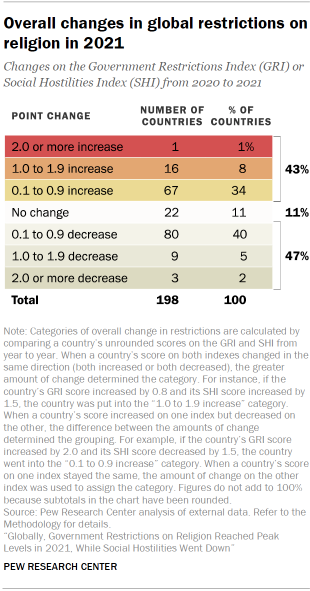
Based on the combined index scores for government restrictions and social hostilities, 92 countries had overall decreases in their scores from 2020 to 2021, 84 countries had increases, and 22 had no change. Of the countries with increases, there were 67 small upticks (between 0.1 and 0.9 points) and 16 modest increases (1.0 to 1.9 points). One country, Uganda, had a large overall increase (2 points or more).
Among the countries with decreases, 80 had small declines (0.1 to 0.9 points) and 9 were modest (1.0 to 1.9 points). Three countries – Bolivia, Sudan and Turkey – had large decreases (2 points or more) in their overall scores.




